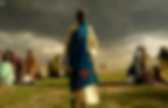

Climate change: Poorest most vulnerable. Typhoon Haiyan: what really alarms Filipinos is the rich world ignoring climate change. I met Naderev Saño last year in Doha, when the world's governments were meeting for the annual UN climate talks.
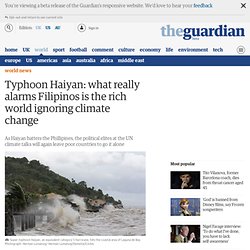
The chief negotiator of the Filipino delegation was distraught. Typhoon Bopha, a category five "super-typhoon" with 175mph winds (282km/h) had just ripped through the island of Mindanao. Philippine delegate weeps at UN climate conference. The devastation caused by Typhoon Haiyan cast a gloom over U.N. climate talks that kicked off Monday in Poland as the envoy from the Philippines — where thousands are believed to have died when the cyclone made landfall Friday — broke down in tears and announced he would fast until a "meaningful outcome is in sight.
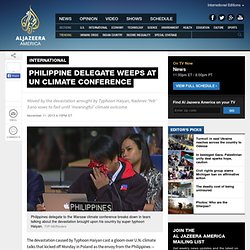
" Naderev "Yeb" Sano's emotional appeal was met with a standing ovation at the start of two-week talks in Warsaw where more than 190 countries will try to lay the groundwork for a new pact to fight global warming. Sano's tears, which he wiped away with a red handkerchief, made other delegates at the COP19 react emotionally as well. IISD VIDEO: Philippines delegate Naderev Saño COP19 Warsaw. The Inequality of Climate Change. Typhoon Haiyan has left an estimated 10,000 dead and hundreds of thousands homeless in the Philippines.
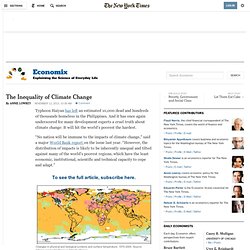
And it has once again underscored for many development experts a cruel truth about climate change: It will hit the world’s poorest the hardest. “No nation will be immune to the impacts of climate change,” said a major World Bank report on the issue last year. “However, the distribution of impacts is likely to be inherently unequal and tilted against many of the world’s poorest regions, which have the least economic, institutional, scientific and technical capacity to cope and adapt.” That is the firmly established view of numerous national governments, development and aid groups and the United Nations as well. Climate change will hit poor countries hardest, study shows. Low-income countries will remain on the frontline of human-induced climate change over the next century, experiencing gradual sea-level rises, stronger cyclones, warmer days and nights, more unpredictable rains, and larger and longer heatwaves, according to the most thorough assessment of the issue yet.
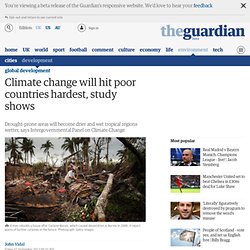
The last major UN assessment, in 2007, predicted runaway temperature rises of 6C or more by the end of the century. That is now thought unlikely by scientists, but average land and sea temperatures are expected to continue rising throughout this century, possibly reaching 4C above present levels – enough to devastate crops and make life in many cities unbearably hot. As temperatures climb and oceans warm, tropical and subtropical regions will face sharp changes in annual rainfall, says the Intergovernmental Panel on Climate Change (IPCC) report, released on Thursday in Stockholm before online publication on 30 September.
Scientists have also lowered projections of sea-level rises. Climate change. Climate change and poverty. In an ever-progressing world which withholds an increasing demand for energy, it is difficult to avoid climate change and its impacts on societies both locally and globally.
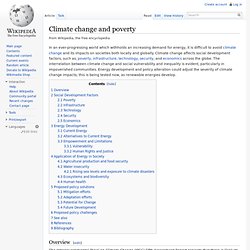
Climate change affects social development factors, such as, poverty, infrastructure, technology, security, and economics across the globe. The interrelation between climate change and social vulnerability and inequality is evident, particularly in impoverished communities. Energy development and policy alteration could adjust the severity of climate change impacts; this is being tested now, as renewable energies develop. Overview[edit] The Intergovernmental Panel on Climate Change (IPCC) Fifth Assessment Report projects that there is likely to be at least a 0.4-1.6 Celsius increase in global mean surface temperature by the period of 2046-2065 and likely a sea level rise of 0.17-0.32 meters by this time due to recent trends relative to 1986-2005 (IPCC 2013). Social Development Factors[edit] Poverty[edit] Security[edit]
Climate Change. Climate change is a hunger risk multiplier, threatening to undermine hard-won gains in eradicating hunger and poverty.
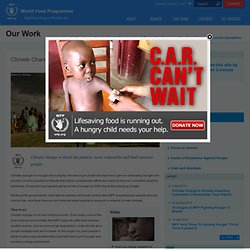
Current projections indicate that unless considerable efforts are made to improve vulnerable people’s resilience, 20 percent more people will be at risk of hunger by 2050 due to the changing climate. Working with governments, international partners and local communities WFP is assisting the people who are most at risk, most food insecure and have the least capacity to respond or adapt to climate change. Time to actClimate change is not only a future concern. Even today, most of the food-insecure communities that WFP supports suffer from extreme weather events, and environmental degradation. In the shorter term, hunger emergencies will increase. Efforts to help governments, communities and vulnerable people to build resilience and better manage climate-related risks are crucial for the global challenge of reducing hunger and undernutrition.
Climate change is already hurting the world's poorest. What have melting glaciers in West Antarctica got to do with social justice today?
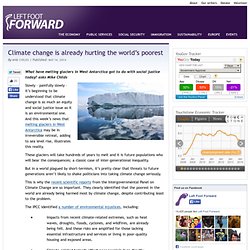
Asks Mike Childs Slowly – painfully slowly – it’s beginning to be understood that climate change is as much an equity and social justice issue as it is an environmental one. And this week’s news that melting glaciers in West Antarctica may be in irreversible retreat, adding to sea level rise, illustrates this reality. These glaciers will take hundreds of years to melt and it is future populations who will bear the consequences; a classic case of inter-generational inequality.
But in a world plagued by short-termism, it’s pretty clear that threats to future generations aren’t likely to shake politicians into taking climate change seriously. Climate change will hit poor countries hardest, study shows. “Climate change can impact poor women’s health” As the threat of climate change slowly becomes a reality, poor women will be the largest social group to feel the heat.
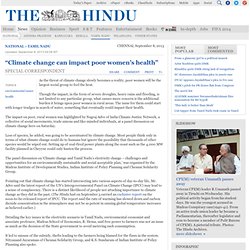
Though the impact, in the form of severe droughts, heavy rains and flooding, is not limited to any particular group, what causes more concern is the additional burden it brings upon poor women in rural areas. The issue for them could start with longer trudges in search of water, something that eventually could impact their health. “Climate change affects the poorest in developing countries” As the impact of climate change gains presence in our everyday lives, many countries have engaged in efforts to mitigate the emission of global greenhouse gases (GHGs) in innovative and cost-effective ways to scale up emissions reductions and foster financial flows, including through so-called carbon market instruments.
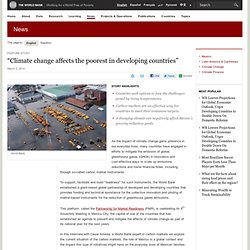
To support, facilitate and build "readiness" for such instruments, the World Bank established a grant-based global partnership of developed and developing countries that provides funding and technical assistance for the collective innovation and piloting of market-based instruments for the reduction of greenhouse gases emissions. This platform, called the Partnership for Market Readiness (PMR), is celebrating its 8th Assembly Meeting in Mexico City, the capital of one of the countries that has established an agenda to prevent and mitigate the effects of climate change as part of its national plan for the next years. 1) What are carbon markets?
The Inequality of Climate Change. Typhoon Haiyan has left an estimated 10,000 dead and hundreds of thousands homeless in the Philippines.
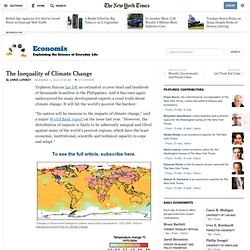
And it has once again underscored for many development experts a cruel truth about climate change: It will hit the world’s poorest the hardest. Climate Change: Countries that Contributed Less are Most Vulnerable; Top Three are Cambodia, Vietnam, Bangladesh; Australia is 31st Least Affected. Chimneys are seen through a window at a coal-fired power plant on a hazy day in Shimen county, central China's Hunan Province, June 2, 2014. U.S. President Barack Obama's plan to cut greenhouse gas emissions from U.S. power plants, due to be announced on Monday, will win muted applause abroad with some hopes it could help a U.N. deal to fight climate change in 2015. Emerging economies including China and India are likely to be lukewarm because they have often said that Obama's plans for emissions cuts until 2020 - even if fully implemented - are far short of the curbs they say are needed by the rich.
REUTERS/Jason Lee (CHINA - Tags: ENVIRONMENT BUSINESS ENERGY CITYSCAPE)